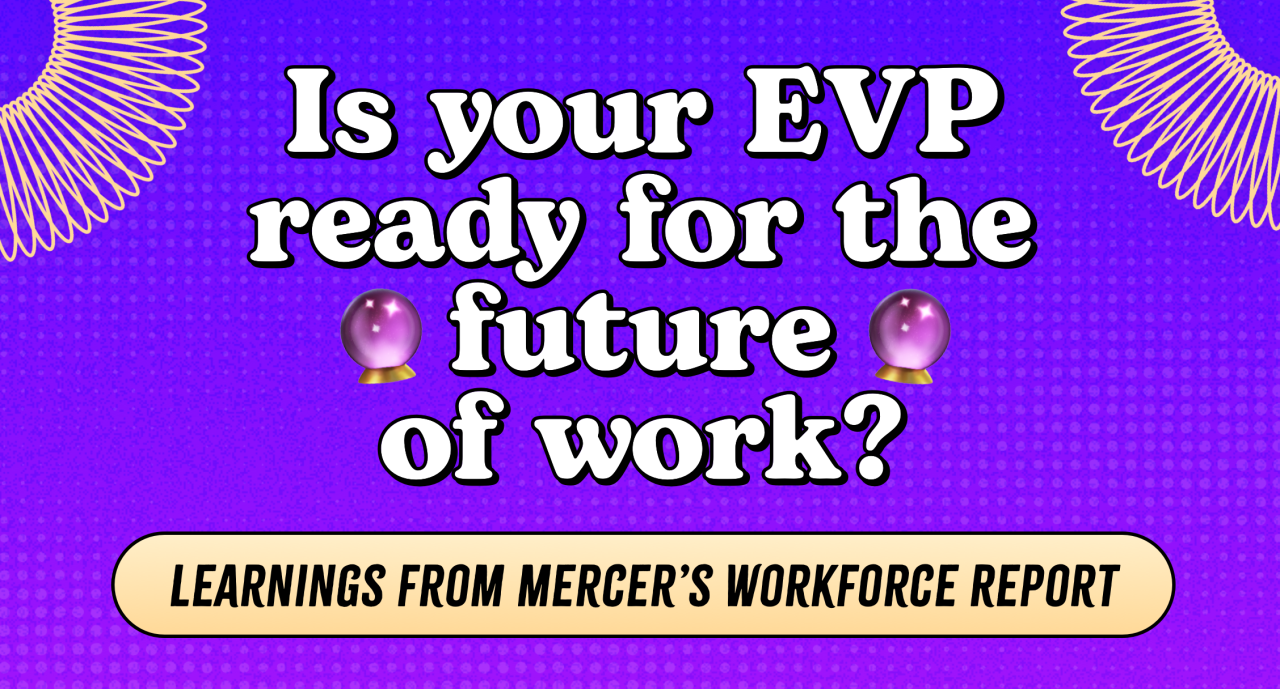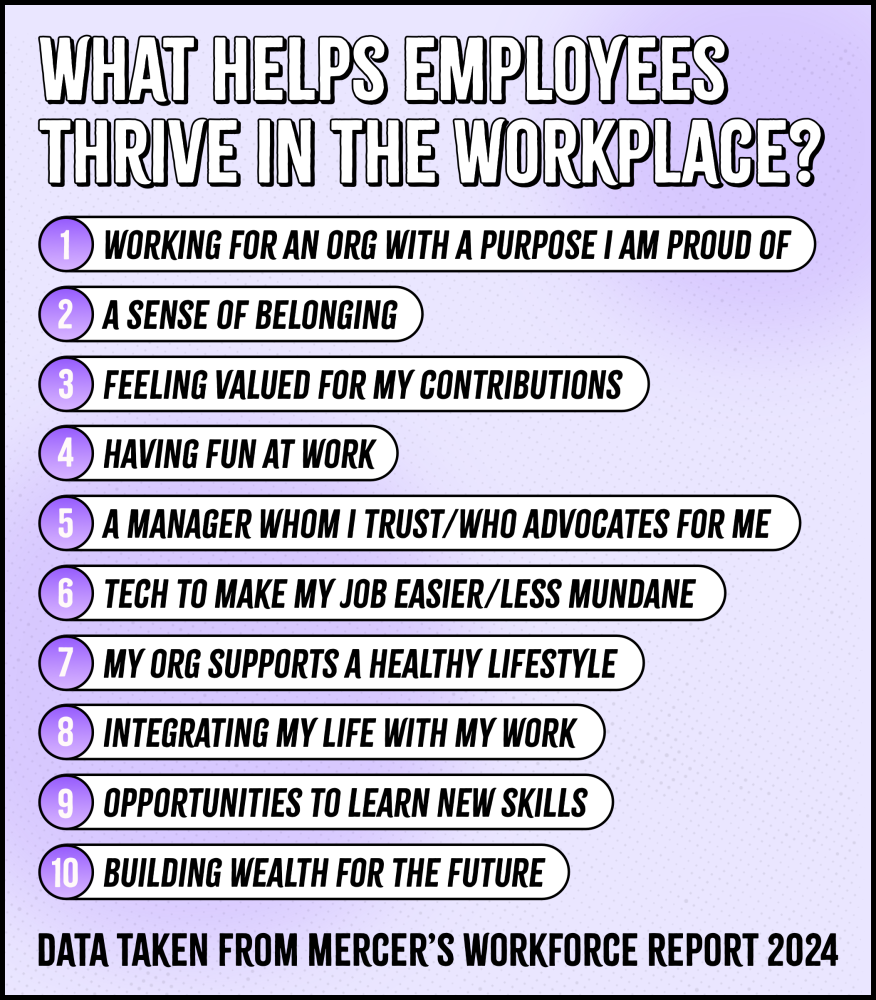Is your EVP ready for the future of work?
Learnings from Mercer’s Workforce Report.
2nd Apr 2024

Mercer's Workforce 2.0 report, which focuses on 'Unlocking human potential in a machine-augmented world.' had a lot of fascinating insights hidden inside!
Mercer interviewed over 12,200 C-suite executives, HR leaders, employees, and investors to uncover the conversations dominating boardrooms and the top priorities for the HR agenda in 2024.
More than half of executives believe that AI and automation will make their organisations 10-30% more productive in the next three years. But to make this happen, they need to rethink how they work and get their people ready for a future where machines play a big role. A big part of this is looking at how companies can best retain and develop top talent, with the all important EVP being a main focus.
Two areas really stood out to us in the report:
1. Why companies need to build trust into their EVP
2. How flexibility plays a key part in boosting productivity.
Both are essential when it comes to preparing for the future of work.
What helps employees thrive in the workplace?
As companies face challenges in maintaining a strong talent pipeline, retention has become more important than ever. Therefore it’s important for employees to leave work feeling not just motivated, but also satisfied with their work. Here are ten key areas that employees say help them thrive at work.

💰 Financial Stability: It's important for employees to have financial stability, which can include benefits like medical care as well as salary. These perks give employees peace of mind and security about their financial future.
🦺 Psychological Safety: Employees crave an environment where they feel safe to be themselves and express their opinions openly. They want to know that their thoughts and ideas are valued and respected, creating a supportive and inclusive workplace culture. They also want practices that promote autonomy and dignity, such as flexible working. Allowing employees to work how and when they want empowers them to work in the best way that suits their needs.
💟 Sense of Purpose: Employees want a sense of purpose in their work. They want to feel like they're part of something meaningful, contributing to a mission that aligns with their values. Knowing that their efforts are making a difference can significantly impact their job satisfaction and motivation.
💻 Digital Enablement: Access to the latest technology is important for employees to perform their best in their roles. They want tools and resources that help them to be efficient and effective, allowing them to stay competitive and adapt to evolving work demands.
🔐 Skills Growth and Job Security: Employees value opportunities for personal and professional growth within their company. They want to work for an organisation that invests in their development, providing training, mentorship, and growth opportunities. Additionally, job security is important, as employees want to feel confident about their future within the company. Offering stability and growth opportunities can help attract and retain top talent.
HR leaders vs employees - What do employees value the most?
How do these areas compare to what HR leaders think are the most important areas to retain talent. Let’s take a look 👇
Here is what HR leaders put in their top 10:
- Job security
- Fair pay
- Work culture
- Wellbeing programs
- Learning opportunities
- Company brand / reputation
- Flexible working
- Competitive rewards
- Confidence in organisational strategy
- Health insurance
And here’s what employees put in their top 10:
- Job security
- Fair pay
- Work culture
- Learning opportunities
- Flexible working
- Competitive rewards
- Workload
- Coworkers / the people
- Confidence in organisational strategy
- Health insurance
Many are really similar, but there are some significant differences that will severely impact the employee experience if discrepancies are not addressed. For instance, HR leaders rank wellbeing programs higher than flexible working, yet wellbeing programs do not feature on employees' priority lists, whereas flexible working ranks in their top 5. This clearly shows that there is a disconnect between what employees want and what HR leaders prioritise.
HR priorities for 2024
It’s not surprising that many HR leaders are focusing on improving the employee value proposition (EVP) to attract and retain top talent in 2024. However, what is surprising is that fewer are prioritising sustainability, accountability and diversity, equity, and inclusion (DEI) goals, despite knowing how important these factors are for business growth. This gap shows that there is a clear lack of understanding when it comes to how DEI is embedded into the EVP. And as we know, you can’t have an inclusive company without embedding DEI from the start.
Here are the top 10 priorities for HR leaders this year:
- Enhancing the EX/EVP to attract and retain top talent
- Investing more in benefits to improve physical/mental health
- Improving workforce planning to better inform buy/build/borrow strategies
- Improving our HR/People analytics capabilities
- Redesigning work to incorporate AI and automation
- Enhancing/modernising rewards practices
- Investing more in benefits related to retirement savings and financial well-being
- Designing talent processes around skills
- Improving people managers’ capabilities
- Investing in talent assessment and employee skills development
How flexible working is boosting productivity
Mercer’s report highlights that 41% of companies will be updating their approach to flexible working this year and only 10% of those are planning to make their approach less flexible.
Therefore, 31% of companies are planning to increase their flexibility 🚀
But why?
✨because of increased productivity ✨
According to the findings we’ll be seeing an increase in flexibility this year, with only 38% of companies remaining on-site full time
🏢 38% of companies are on-site full-time
🧑💼 16% are on-site most of the time
⚖️ 27% are hybrid 50/50
💻 10% are remote-first
🌏 10% are fully remote
The report talks about how making a multidimensional view of flexible work is important to increase productivity, and I couldn’t agree more. Particularly in sectors like manufacturing, retail, and healthcare where traditional location-based or hours-based flexibility isn't always possible.
HR leaders found that by focusing on the following 6 dimensions, means they can embrace flexibility more easily for all roles. This not only helps with job redesigns but also removes barriers that stop attracting top talent.
Mercer’s six dimensions of flexible working
Where: Consider the location and infrastructure needed for flexible working, whether it's a blend of in-office and remote work, fully remote setup, or remote-first approach.
When: Focus on flexible working hours, emphasising productivity over fixed schedules.
What: Evaluate role requirements and consider options like part-time, compressed, or shared roles.
Who: Assess the individuals performing the roles and explore ways to support them in maximising their potential.
How: Use technology to enable flexibility in carrying out job responsibilities.
Why: Connect the flexibility of work arrangements back to the mission and purpose of the role, ensuring alignment and relevance.
Why you need to build trust into the EVP
Trust in organisations reached an all-time high back in 2022, driven by listening, collaboration, and empathy during the pandemic.
However, since then, it has taken a downturn, with employees showing less confidence in their companies' actions. Trust that employers will do the right thing for employees fell from 80% to 69%, and HR leaders have also lost trust, with 45% rating their organisational culture as low trust. With employees who trust their organisation are twice as likely to report they are thriving it’s important to prioritise building trust into your EVP.
Here are some of the benefits you can expect when you begin to build trust in your EVP:
- You can attract aligned candidates. By showcasing culture and values upfront, companies attract talent that fits - and repel those that don't. Clear transparency ensures candidates understand the day-to-day reality in your company, not just the marketing spiel!
- You can build an authentic employer brand. Getting employees to share authentic experiences builds trust with candidates and boosts your employer brand. Being able to put employees front and centre to advocate for your brand and create Employee Generated Content can only happen when employees are proud to work for you. Transparency and clarity are a big part of this.
- It will Improve hiring efficiency. Being upfront and honest from the beginning saves time by moving away misaligned candidates earlier in the process as they will self-select in or out depending on the right cultural fit. Being as authentic and honest as possible with candidates is key not only in hiring but also retention because you reduce the number of candidates who don’t pass their probation periods or turn out to be a poor fit.
- Boost retention and loyalty. By sharing clear expectations and commitments to employees from the outset, the EVP creates a mutual understanding between the organisation and its employees. When employees have a clear understanding of what to expect in terms of company culture, career development opportunities, benefits, and work-life balance, they are less likely to become dissatisfied later on.
- Creates a sense of belonging and champions DEI - By creating an EVP that creates a sense of belonging you’re not only encouraging diversity in all its forms but also championing diversity, equity, and inclusion (DEI) initiatives within the organisation. When employees feel valued and respected for their authentic selves, they are more likely to contribute their unique perspectives and talents to the workplace. This inclusive environment not only enhances employee morale and engagement but also attracts diverse talent.